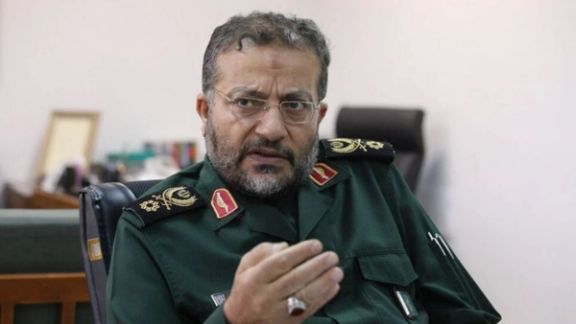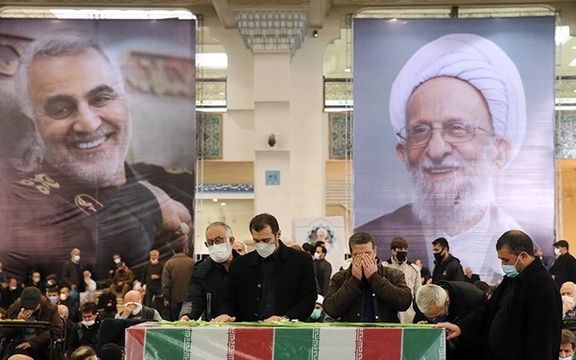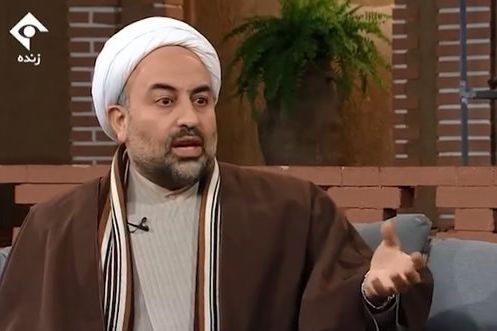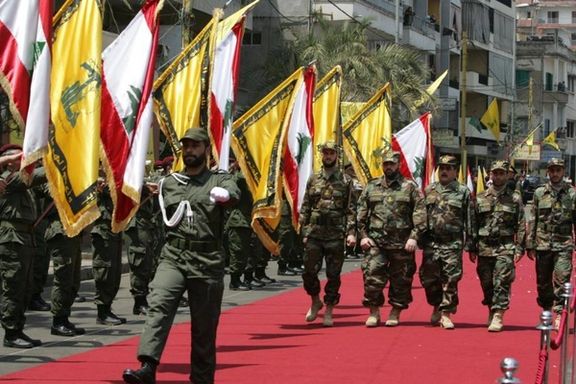Iran Aims To Set Up Basij Paramilitary Bases In 11,000 Neighborhood

Iran's Revolutionary Guard (IRGC) has announced plans to set up Basij paramilitary bases in about 11,000 neighborhoods across the country by March 2023.

Iran's Revolutionary Guard (IRGC) has announced plans to set up Basij paramilitary bases in about 11,000 neighborhoods across the country by March 2023.
The head of the Basij Organization, under the command of the IRGC, said that there are 50,000 neighborhoods in the country, therefore when the plan – dubbed Islamic neighborhoods – is implemented, Basij will have active presence in about one-fifth of the neighborhoods all over Iran.
The move is a measure to strengthen internal security in the country, by establishing control over residents in these neighborhoods.
Brig. Gen. Gholamreza Soleimani commander of the Basij made the remarks during a Thursday meeting in Shahrekord, where a memorial statue of Qasem Soleimani, the commander of Iran’s Qods Force, was set on fire on Wednesday.
Soleimani added that the neighborhood patrols scheme has been carried out in about 800 locations so far, and Basij is ready to provide support for all the mosques that would join the project.
The Basij commander was sanctioned by the US and the Council of Euopre in 2021 for his role in the violent crackdown during the bloody November 2019 protests.
The Basij is a paramilitary force of mostly young volunteers, who receive benefits. Its members usually go through limited training to serve as an auxiliary force in local security and enforcing state control over society through suppressing demonstrations and gathering intelligence.

Iran has condemned four countries who announced Thursday they would take action against Tehran over compensation for the downing of a Ukrainian plane in 2020.
Iran’s foreign ministry issued a statement Friday accusing Canada, Sweden, the United Kingdom and Ukraine of “mis-using this incident,” saying it will only negotiate with each country separately.
The four countries with the greatest number of victims on the Ukrainian International Airlines flight shot down over Tehran have formed the International Coordination and Response Group to support families of victims of flight PS752.
On Thursday, the four countries in a joint statement said they had abandoned efforts to talk to Iran about reparations and would try to settle the matter according to international law.
"Despite our best efforts over the past two years and multiple attempts to resolve this matter through negotiations, the Coordination Group has determined that further attempts to negotiate with Iran ... are futile," the statement said.
Flight PS752 was shot down by two air-defense missiles fired by Iran’s Revolutionary Guard (IRGC) in the morning of January 8, 2020, as it took off from Tehran’s Imam Khomeini International Airport. All 176 people on board were killed.
Just hours earlier Iran had fired ballistic missiles at bases in Iraq hosting US troops and was expecting a retaliation, but it failed to close the civilian airspace. After the tragic incident, the government tried to hide the true cause for three days, but after amateur video footage emerged showing the plane exploding it admitted that the military was responsible but said that a “human error” had taken place,
Tehran never allowed an independent investigation or provide full answers to questions by other countries, such as Ukraine. Eventually it put ten lower-ranking military personnel on trial, while victims’ families demanded investigation of senior government officials in charge.
In the Friday statement Iran’s foreign ministry emphasized on sovereignty of states over air disaster incidents on their territory, more of an argument Tehran has used not to provide answers, such as who in the command chain issued orders that day. It has also argued that a “radar misalignment” caused the incident but that begs the question of why two missiles were fired 30 seconds apart.
The statement also said that Iran is ready to pay reparations to the families of thirty foreign nationals. The amount Iran has decided to pay is $150,000 per victim. Mentioning 30 victims means that Iran does not want to recognize those who were dual national residents of Canada or Sweden as automatically eligible for the $150,000 compensation.
Iran’s government announced in December 2020 that all victims would receive the $150,000 compensation, but a year later, it said that it has paid just a few families.
In countries with independent courts families of victims can pursue legal avenues to receive compensation or demand accountability in such an incident, but in Iran courts and prosecutors are all part of the Judiciary controlled by the Supreme Leader Ali Khamenei.
A Canadian court just recently awarded C$107 million ($84 million) to the families of six people who had sued Iran. More court cases are pending in Canada.
In May 2021, an association representing the families of victims announced on social media that some families have received an electronic message from the military prosecutor handling the case informing them that high-ranking officials cannot be prosecuted.

Many Friday Prayer Imams in Iran have talked about revenge for the targeted killing of Qasem Soleimani in their weekly sermons and urged American forces to leave the region.
Tehran’s interim leader of the weekly Friday congregation, Kazem Seddiqi, said the United States had thought that killing Soleimani would weaken the ‘resistance front’ but it proved to be the opposite.
He said that Soleimani created a united front for the resistance forces in Iran, Iraq, Yemen, Lebanon, Pakistan, and Afghanistan that provided new ways for the resistance forces.
Seddiqi praised recent attacks on Iraq’s Ain al-Asad base as revenge for the killing of Soleimani and Abu Mahdi al-Muhandis, the Iraqi commander of the Popular Mobilization Forces in January 2020.
Such remarks against the presence of American troops in the region were echoed by many other Friday Imams, which usually serve as a platform to promulgate the official policies and views of supreme leader Ali Khamenei.
The ongoing Vienna nuclear talks and restriction on the Internet were apparently among the other directives on agenda for today’s Friday prayers.
During numerous ceremonies and publications to mark the second anniversary of Soleimani’s killing in a US drone strike, the Islamic Republic tried to claim ultimate victory by saying that the US is leaving the region, by emphasizing the American departure from Afghanistan.

An Albanian male soccer coach has received a police text message over violating Iran’s hijab laws after being caught by a traffic camera while in a car.
Shpejtim Arifi, a Kosovar Albanian with German citizenship, manages the Persepolis junior team. He was a prolific goal-scorer transferred to Persepolis for $850,000 in 2009 after joining Payam the previous year.
Fluent in Persian, Arifi is well known, partly for football, and partly through fashion modelling and appearances in television and cinema films. He was riding in a friend's car in Tehran when the friend’s phone bleeped.
"The text message shocked us at first because I had been mistaken for a woman flouting her hijab,” Arifi told Sports News . “I think it was the traffic camera that took my image. My friend was taken aback at first but then we laughed a lot…Later, many other friends called or sent text message to joke about this incident.”
Arifi explained he had grown his hair long since he was 18 and had no intention of cutting it.
“I've lived in Iran for many years looking the same and never had a problem,” he said. “I think it was a misunderstanding and nothing can be done about it.”
Iranian morality police who dress code and other “un-Islamic” behavior have an easier job in the streets, where they stop violators and order them to fix their hijab or even arrest them, but it is harder to control people riding in cars.
A method to deal with this started a few years ago when police monitoring cameras became prevalent. The morality police who notice a hijab violation send text messages – citing the vehicle's plate number, time, date, and location – to female drivers or passengers who drop their headscarf when driving, and drivers are responsible for their passengers. On the second offense, drivers must report to a police station within ten days, and may have their vehicle confiscated by court order if they fail to do so.
Women who break hijab laws while in a car can face a cash fine, penalty points on their license, and a maximum two months’ jail.
While the long black veil (the chador) is promoted as the best hijab in many government offices and educational establishments, a headscarf covering hair and shoulders and a long coat (manteau) coming below knees are generally acceptable. Many women, however, twist the rules. Headscarves that show hair in the front and back often slip down on the shoulders, while manteaus can be very tight.
A report by the parliament's research center in 2018 said the number of Iranians who believed in compulsory hijab had waned. According to the report those who considered the hijab a value that could be defined by law had fallen from 85 percent in the early 1980s to around 35 percent.

A well-known Iranian cleric has talked about the growing hatred and grudge towards the clergy in Iran, warning of a crisis unfolding in society.
In an Instagram post on Friday, Mohammad-Reza Zaeri said that a taxi driver refused to pick him up and told him “I will not give rides to mullahs.”
Zaeri, who often appears on state-controlled television programs, added that he had been spat on and sworn at a few times only in the last 10 days.
He said that those officials who have chauffeurs and bodyguards should be aware of this level of hatred and grudge that is creating a social crisis, stressing that “we had warned about this for years.”
The cleric, who is a former editor of the popular Hamshahri daily and head of the House of Young Journalists, has sometimes talked against compulsory hijab. During a lecture in Qom seminary in 2015, he described the policy of enforcing hijab as a failure.
Earlier in the week, Mohammad Taghi Fazel Meybodi, a member of the Assembly of the Qom Seminary Scholars and Researchers, said that clerics and seminary students are avoiding their usual garb for fear of being insulted in public.
Last week, a woman in the religious city of Qom was arrested for arguing with a clericand trampling on his turban after he and another cleric warned her over her hijab.

Saudi Arabia’s ambassador to Lebanon has condemned remarks by Hezbollah leader Hassan Nasrallah, expressing hope that Leabnese will end the group's "hegemony" in the country.
Earlier this week, Nasrallah called King Salman a “terrorist” and accused Riyadh of exporting Islamic extremism.
Saudi envoy Waleed Bukhari, who left Lebanon in late October, said on Thursday that “Hezbollah’s terrorist activities and regional military behavior” threaten the security of Arab countries.
“Riyadh hopes that political parties will give priority to the supreme interest of Lebanon… and end Hezbollah’s terrorist hegemony over every aspect of the state,” Bukhari said, stressing that ties with Lebanon are too deep to be affected by “irresponsible and absurd statements.”
Lebanese Prime Minister Najib Mikati said criticism of Saudi Arabia by the leader of the Iran-backed Hezbollah group did not serve the national interest or represent the country’s official stance.
Late in October, Saudi Arabia severed diplomatic relations with Lebanon following statements by the then-Lebanese information minister criticizing Riyadh’s military intervention in Yemen. The Saudi foreign minister later said that Hezbollah’s dominance in Lebanon, and not just the minister’s comments, had prompted the Sunni kingdom to cut ties.
Saudi Arabia and other wealthy Arab states always assisted Lebanon, which is struggling with an unprecedented economic crisis since 2019.